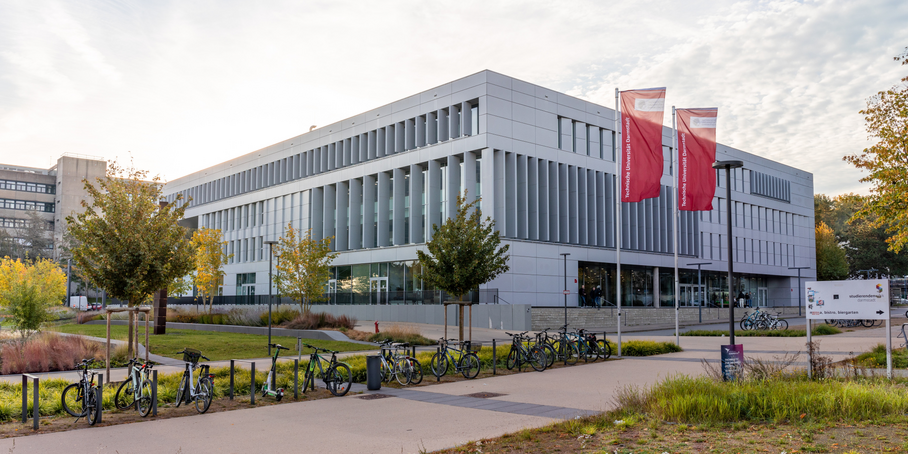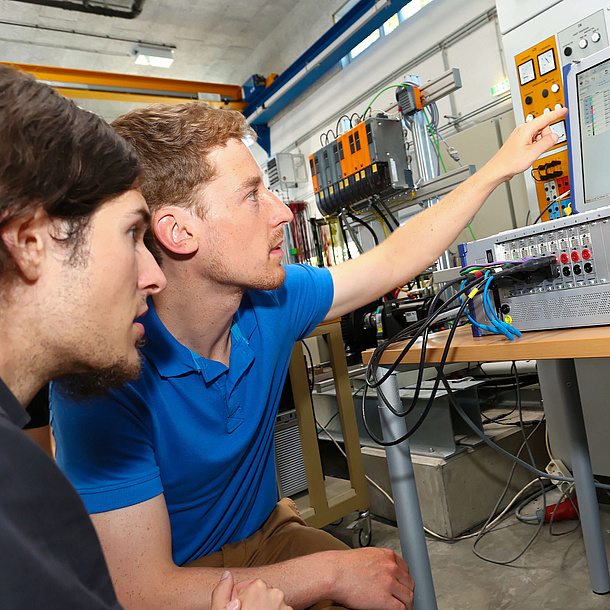- Duration of study: 4 semesters
- ECTS credit points: 120
- Academic degree: "Diplom-Ingenieurin" or "Diplom-Ingenieur" ("Dipl.Ing." or "DI"), equivalent to the Master of Science (MSc)
- Language of instruction: Englisch
The Master's Programme
This Master's degree programme takes into account the wide range and innovative potential of electrical and electronics engineering as well as the rapid changes that are taking place in the professional field. In addition to factual knowledge, you will learn how to apply scientific methods that you will later use to systematically develop innovative solutions in your profession.
You will learn about different application areas for electrical and electronics engineering systems, e.g. components of power plants and energy supply, electromobility, communication networks, industrial systems and the field of integrated circuits. In all of these areas, you will analyse problems and come up with innovative solutions. You will be expected to lead project groups and conduct technical discussions in English.
The degree programme also forms a good foundation for working in interdisciplinary teams. The expression of team spirit is already encouraged at the institute. Electrical and Electronics Engineering is a degree programme that thrives on intensive exchange, whether this takes place in the well-equipped laboratories, in the study spaces, the canteen, or in the Dynamo Engineering Drawing Studio or the High-Voltage Drawing Studio.
The field of electrical and electronics engineering is broad and full of possibilities. You are free to choose the subfield that you want to specialize in. From the 1st semester and on, you can choose out of the five in-depth specializations:
Automation Systems Engineering: subjects include: Electric Machines and Drives, Power Electronic Systems, Modelling and Simulation, Electronics, Signal Processing Systems, Control Systems, Embedded Systems, Measurement Systems
Electronic Systems and IC Design: subjects include: Analog and Digital Electronic Systems, Integrated Circuit Design and Application, Radio Frequency Systems and Signal Processing
Power Engineering: subjects include: Electric Drives and Power Electronics, Electrical Power Systems, High Voltage Engineering, Energy System Analysis and Optimization
Sensing, Control and Artificial Intelligence: subjects include: Artificial Intelligence, Automatic Control, Modelling and Simulation, Sensing, Signal Processing
Wireless Networks and Communication Systems: subjects include: Communications, Communication and Sensing Systems, Speech Signal and AI, Audio Signal Processing and Acoustics, Networking, Microwave Engineering, Antennas and Wave Propagation

I’m fascinated by how many of the most relevant topics for the future, like mobility, using energy efficiently, or data security, are influenced and sustainably changed by microelectronics. This is why the Master’s Degree Programme in Electrical Engineering was the perfect choice for me.
For example, you learn how chips are made out of semiconductor materials, how computers and smartphones are built, how data transmission and data processing work, and where and how sensor systems are used.
Students at TU Graz have access to an excellent technical infrastructure. This includes:
- the Nikola Tesla Laboratory, where diverse investigations and tests are carried out in the field of high-voltage technology,
- an antenna measurement chamber, where, for example, measurements of electromagnetic compatibility are carried out, and
- the Christian Doppler Laboratory for brushless drives for pump and fan applications.
Admission
The prerequisite for admission is a completed bachelor’s degree in a relevant subject (see curriculum).
Additionally, you need to provide evidence of competence in the English language.
Graduates of the following Bachelor’s degree programmes at TU Graz are admitted without needing to fulfil further requirements:
- Electrical and Electronics Engineering
- Electrical Engineering and Audio Engineering
- Digital Engineering
- Information and Computer Engineering
- Biomedical Engineering
Graduates of other Austrian universities can apply for admission.
Graduates of other foreign universities can obtain information and apply for admission by contacting study@tugraz.at.
- Admission and deadlines for Austrian students who are beginning their studies at TU Graz for the first time
- Admission and deadlines for international students
- If you are or were already admitted to a degree programme at TU Graz, please come to the TU Graz Registrar’s Office in person during the admission period or contact study@tugraz.at.
Contact study@tugraz.at
Double Degree Programme
As part of the Master's degree programme, you can complete a Double Degree Programme with Technical University of Darmstadt specialising in energy-efficient and sustainable microelectronics. You study both at TU Graz and TU Darmstadt and receive a degree from both universities.
At TU Graz you have to complete 60 ECTS:
- from compulsory module A (Erweiterte Grundlagen): 16 ECTS
- from the elective module B2 (Major Electronic Systems and IC Design): 12 ECTS
- from the elective moduleC2 (Major Electronic Systems and IC Design): 26 ECTS
- from the elective module D5 (Wireless Networks and Communication Systems): 6 ECTS
At TU Darmstadt you have to complete 60 ECTS:
- from the Master's programme Information and Communication Engineering (Specialisation Communication Hardware and Studium Generale): 30 ECTS
- Master's thesis primarily supervised by a lecturer at TU Darmstadt: 30 ECTS
Further information can be found in the curriculum.

On courses and content
Bernd DEUTSCHMANN
Univ.-Prof.
bernd.deutschmann@tugraz.at
Institute of Electronics
sek.ife@tugraz.at
On the mobility scholarship
Manuel AUSSERLECHNER
MA
International Office
manuel.ausserlechner@tugraz.at
Career Prospects
Our world is undergoing rapid technological change. In the Master's degree programme Electrical and Electroncis Engineering, you will receive an education that enables you to shape the future developments. This programme places a focus on:
- intelligent and resource-efficient energy supply and distribution,
- the digitalization of society and industry and
- future applications of networked mobility.
As a programme graduate, you will conduct research and develop applications in all areas of electrical engineering and information technology. You can work
- in research, development and production departments,
- in energy supply and telecommunications companies,
- in the field of mobility,
- in teaching and training,
- as an independent business owner.
Acquire AI skills: AIE Extension Programme
Increase your career prospects with the Artificial Intelligence Engineering (AIE) extension programme and learn essential skills in AI development and application during or after completing your Master's degree.




